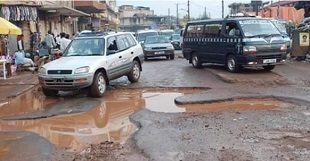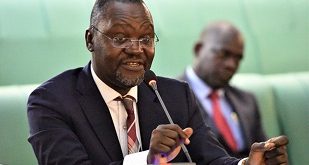
By Andrew M. Mwenda
The folly and delusions of a nation that has forgotten the concerns of its ordinary citizens
And so it was that on Nov. 4, I flew to New York City from London via Amsterdam. Upon landing at JFK International Airport, I entered the longest queue in the history of international travel and immigration clearance; there, a hoard of not less 4,000 human beings snaked inside the terminal building waiting for clearance.
The process of entering this “free” country is possibly the most excruciating. First, you have to go through the most rigorous security checks at the port of boarding; in my case London.

Each passenger is individually taken out of the queue, questioned by a US government agent, documents thoroughly checked and finally cleared to go through security.
Going through security is itself another slow and agonising experience. Passengers have to remove everything piece by piece: wallets, handkerchiefs, watches, belts, shoes, laptops and iPads. They have to surrender any drinks or perfumes or lotion, enter a gigantic security X-machine, raise one’s hands in surrender as this piece of equipment takes a digital picture of your body, all your body.
And even then, with this ultra-modern technology, the process is not yet done. Once out of the machine, a security officer begins the process afresh, checking you slowly and meticulously by touching and feeling your body from shoulders to toes, emphasising areas around your pelvic region, literary feeling your dick – well because a Nigerian boy tried to use an underwear to blow up a plane. Funny that the security officials largely put in place measures to deal with past experiences rather than predict future ones. Why would the next terrorist use the methods that were used before and are therefore on the security radar screen? Anyway, after about 10 minutes, one is finally free to board the plane to visit America.
For most non-Americans, the agony of entering America today actually begins when applying for a visa. It takes a minimum three months to get an appointment online; as I write this article the nearest appointment for Kampala is in March 2012. Then one also has to fulfill cumbersome visa requirements: an invitation letter with a bank statement of your host to prove they can feed and house you; submit your own bank statements to show that you earn sufficient income at home etc. The visa application forms are clear that one is presumed a potential illegal immigrant into the US until they prove themselves otherwise. Although consular officials exempt me from all this (due to my regular travel to the US) most Ugandans go through it.
Then for your passport photo, you need a special size taken without your glasses if you wear them; otherwise the embassy will turn you away. And you have to submit your fingerprint and a picture of your eyes. The first time my fingerprint and picture were taken this way was when I was going to jail; the second was when I was applying for a visa to America and when I was entering the country. Now even at Entebbe airport, this process has begun. The world isn’t free anymore.
As I have been travelling to the US more than five times every year for the last five years, I have grown wary of what is happening to this country’s free spirit. Increasingly, I encounter a paranoid nation ruled by opportunistic politicians so desperate to cling onto or take a grab at power that they govern by pandering to public sentiments. Rather than lead on the basis of a set of values, they are instead led by public opinion, itself that changes every hour. And all the time, those who control the platforms of expression have perfected the art of selling fear to the population.
Americans are told from morning to evening that everyone hates them (and that everyone loves them at the same time). The politicians sing fear, the journalist repeat the chorus. All debate on terrorism is about fear and hence how to design even more draconian controls on how people travel. There is almost no debate to challenge the current obsession with tighter and ever tighter security arrangements.
In this free country with supposedly independent media, it is often difficult to distinguish the word of the government from the word of the journalist – one is a spokesperson of the other. It is also difficult to find people in academia and civil society who challenge these self aggrandising rules of the security system. Yet this is not a fear of death per se but rather a fear of a particular type of death – terrorism – that politicians and journalists have made a taboo even at the price of taking away peoples liberties.
For instance, over 115 Americans die daily in car accidents, that is over 43,000 per year. Over 2.9 million get injured in car accidents per year. Over 30,000 die per year of gunshot wounds. To date plane crashes – even with terrorists looming everywhere – hardly kill anyone in this country. So if it is the desire to protect life, surely, there should be a large campaign against drunk and other forms of reckless driving in America and there should be a large campaign against the Second Amendment on the right to keep and bear arms.
America’s response to protecting its citizens from another terrorist attack is disproportionate to the threat the country faces. The country is becoming one vast prison of fear; its freedom of speech greatly compromised by political correctness, its space for policy alternatives undermined by the hegemonic influence of a distorted free market ethic and the myth of “the American dream” and its politics polarised along this very narrow spectrum of policy ideas.
 The Independent Uganda: You get the Truth we Pay the Price
The Independent Uganda: You get the Truth we Pay the Price



